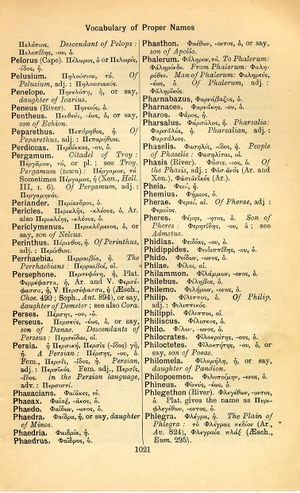Phaedrus: Difference between revisions
νεκρὸν ἐάν ποτ' ἴδηις καὶ μνήματα κωφὰ παράγηις κοινὸν ἔσοπτρον ὁρᾶις· ὁ θανὼν οὕτως προσεδόκα → whenever you see a body dead, or pass by silent tombs, you look into the mirror of all men's destiny: the dead man expected nothing else | if you ever see a corpse or walk by quiet graves, that's when you look into the mirror we all share: the dead expected this
(D_7) |
(Gf-D_7) |
||
| Line 1: | Line 1: | ||
{{WoodhouseENELnames | {{WoodhouseENELnames | ||
|Text=[[File:woodhouse_1021.jpg|thumb|link= | |Text=[[File:woodhouse_1021.jpg|thumb | ||
|link={{filepath:woodhouse_1021.jpg}}]]Φαῖδρος, ὁ. | |||
}} | }} | ||
{{Lewis | {{Lewis | ||
Revision as of 07:44, 14 August 2017
English > Greek (Woodhouse)
Φαῖδρος, ὁ.
Latin > English (Lewis & Short)
Phaedrus: (nom. PHAEDER, Inscr. Grut. 1111, 3), i, m., = Φαῖδρος.
I A pupil of Socrates, a native of Myrsinus, in Attica, after whom Plato named one of his dialogues, Cic. de Or. 1, 7, 28; id. Or. 4, 15; 12, 39; id. Fin. 2, 2, 4; id. Tusc. 1, 22, 53 al. —
II An Epicurean philosopher of Athens, an instructor of Cicero, Cic. Fam. 13, 1, 2; id. Fin. 1, 5, 16; id. N. D. 1, 33, 93; id. Phil. 5, 5, 13.—
III A freedman of Augustus, a Thracian by birth, and author of some well-known Latin fables.
Latin > French (Gaffiot 2016)
Phædrus,¹⁵ drī, m. (Φαῖδρος),
1 un des disciples de Socrate dont Platon prit le nom comme titre d’un dialogue [le Phèdre] : Cic. Tusc. 1, 53
2 philosophe épicurien : Cic. Fam. 13, 1, 2
3 Phèdre [fabuliste].

